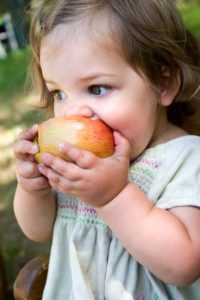 Q. What should I look for when buying fruit juice? For example the “100% pure and natural orange juice” says it contains 0% Vitamin C. How is that possible? Another one provides 100% Vitamin C but from the list of ingredients we see that Vitamin C is actually added.
Q. What should I look for when buying fruit juice? For example the “100% pure and natural orange juice” says it contains 0% Vitamin C. How is that possible? Another one provides 100% Vitamin C but from the list of ingredients we see that Vitamin C is actually added.
A. The USDA considers a half cup of fruit juice equivalent to a serving of fruit but I have my doubts. Processed fruit juice–even 100% juice–is a distant second to fresh whole fruit in terms of its nutritional value. For one thing, fruit juice is a very concentrated source of sugar and calories. All the fiber, which slows the absorption of the sugars in whole fruit, has been removed.
Secondly, many (most?) of the naturally-occurring nutrients are lost during processing, pasteurization, and storage. As you found, manufacturers may compensate for this by adding nutrients back to the juice after the fact. You could get the same benefit from taking a vitamin C capsule.
See also: Juicing for Health and Nutrition
Juice and Diabetes Risk
Nutritionally, I’d rank processed fruit juice only slightly higher than soda and other sweetened beverages. In fact, a large study conducted in China found that people who drink two or more servings of juice a week are 25% more likely to develop Type 2 diabetes compared to those who rarely drink juice. This is consistent with another large 2008 study, which also found that increased juice consumption led to an increased risk of Type 2 diabetes–but that eating more whole fruit decreased diabetes risk.
My Advice?
Eat Fruit; Drink Water. (Same for your kids!)
_____________
My newest book, Secrets for a Healthy Diet: What to Eat, What to Avoid, and What to Stop Worrying About is my essential guide to all the food choices you make every day. Read a sample chapter here.

Amen to that! I only count fruit juice marginally better then sodas … due to the lack of caffeine and carbonation. I have hypoglycemia and can only handle water and herbal teas… that is what I give my kids too. There are so many yummy flavored brew-able teas that can be iced … my boys love iced blueberry green tea. Thanks for the GREAT post! ~ Laura
I wonder if the situation is the same for most vegetable juices. V8 juice, for example, has almost no fiber while the 8 veggies it’s made from are fiber-rich.
-Steve
Steve, tomato based vegetables juices are a low lower in sugar. For me, the lack of fiber is a bigger concern with fruit juices (and fruit-and-vegetable “fusion” juices) which are high in sugar.
WOW I could not agree more. In one of my first blog posts ever last month I mentioned how juicing is a process even when it is done organically. And in more recent posts about the whole arsenic in apple juice controversy I touched on it again. Monica you took the words out of my mouth well out of my blog lol. I said just that the kids should be drinking water and eating an apple! I swear I said it before I read this lol. It is nice to come across like minded people. I hope you get a chance to check out my blog. Here is a link to the arsenic in apple juice post. http://organicallythought.com/arsenic-dr-richard-besser-dr-mehmet-oz